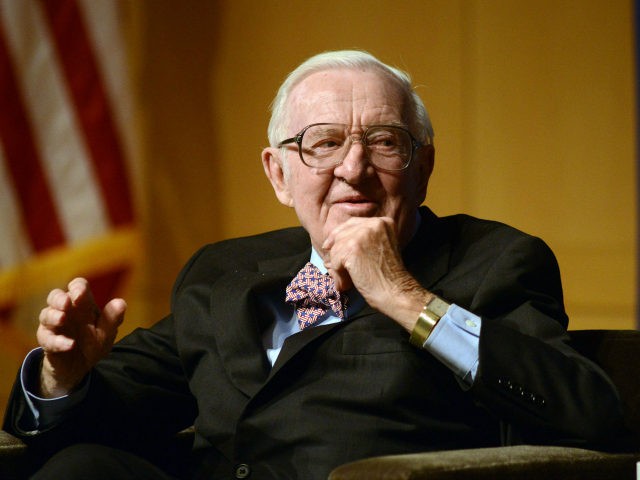Supreme Court Justice John Paul Stevens, who led the liberal wing of the Court for many years until he retired in 2010, died Tuesday in Florida at the age of 99.
Stevens joined the Supreme Court in 1975, taking the seat of Justice William Douglas, whose 36 years in office made him the longest-serving justice in American history. Stevens would almost beat Douglas’s record, serving almost 35 years and retiring as the third-longest-serving justice out of the 114 Americans who have served on the nation’s highest court.
President Gerald Ford appointed Stevens in 1975, during the brief tenure of the only occupant of the Oval Office who was never elected to national office. (Pursuant to the Constitution’s Twenty-Fifth Amendment, President Richard Nixon nominated Ford as vice president in 1973 upon the resignation of Vice President Spiro Agnew, and Ford was confirmed by both the House and Senate. When Nixon resigned in 1974, Ford ascended to the presidency.)
Ford was a liberal Republican – a breed not often seen today in national politics – and picked a like-minded liberal in Stevens. Ford was openly pro-abortion and favored big government policies on a broad range of issues.
Stevens came to lead the liberals on the Court following the 1990 retirement of Justice William Brennan, earning a reputation of following in Brennan’s footsteps as a savvy navigator of his fellow justices’ philosophies, cobbling together majorities to craft liberal decisions.
While Stevens was considered a moderate when serving as a federal appellate judge from 1970 to 1975, he did not disappoint Ford on the Supreme Court, becoming a reliably liberal vote for constitutional rights that are found nowhere in the text, structure, or history of the Constitution, such as abortion.
He believed that the Supreme Court was not required to follow the original public meaning of the Constitution, seen in many of his decisions. He reinterpreted the Establishment Clause to require a strictly secular public square and allowed the federal government to criminalize groups such as the National Rifle Association from participating in elections by holding that organizations have no First Amendment rights, a decision that was overruled in the 2010 Citizens United case.
Stevens also dissented in the famous Heller case in 2008, arguing that the Second Amendment does not protect the right of any American to own a gun, and, thus, the government could forbid all firearm ownership nationwide.
Although in 1976 he supported the death penalty, during his leftward drift from the original meaning of the Constitution – because he readily acknowledged that the Framers of the Constitution accepted capital punishment – he took every opportunity in later years to argue that the death penalty was “cruel and unusual punishment” that violated the Eighth Amendment.
Surprising some people given that he had been a military officer, Stevens also led the Court to the left during the first decade of the War on Terror, securing narrow Court majorities to expand the judiciary’s authority to override wartime decisions by the president as commander-in-chief and to strike down wartime laws passed by Congress. Stevens won over moderate Justice Anthony Kennedy in key cases, such as the 2008 Boumediene v. Bush case, holding that terrorists captured on foreign battlefields had habeas corpus rights to petition a federal judge to order their release.
For all of that, Stevens was well-liked by his colleagues as a good friend who was completely sincere in his beliefs. He had a reputation as a hardworking justice, and also one who was likely to ask unanticipated questions during oral arguments that lawyers would answer without being able to figure out where Stevens was going, only to discover moments later that they had now boxed themselves into a corner that made it harder to win their case.
“He brought to our bench an inimitable blend of kindness, humility, and wisdom, and independence,” Chief Justice John Roberts said in a statement on behalf of all nine current justices, extending their “deepest condolences” to the Stevens family.
Stevens was born in 1920 in Chicago, where he later graduated from the University of Chicago and Northwestern University School of Law, which has since been named in his honor. Between these two schools, he served in the military as a Navy officer in World War II. After the war and law school, he clerked for Justice Wiley Rutledge on the Supreme Court. Serving as a law clerk was rare among future justices at that time, but in modern times has become almost a prerequisite for being appointed to the High Court.
When Stevens retired in 2010, President Barack Obama appointed Justice Elena Kagan as his successor.
He remained physically active after retiring at the age of 90.
He suffered a stroke on Monday and died the following day due to complications from that incident. His daughters, Elizabeth and Susan, were by his side as he passed away in Florida.
Ken Klukowski is senior legal analyst for Breitbart News. Follow him on Twitter @kenklukowski.

COMMENTS
Please let us know if you're having issues with commenting.